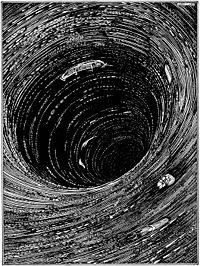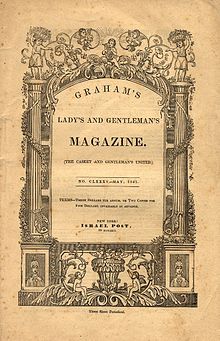- A Descent into the Maelström
-
A Descent into the Maelström 
Artist Harry Clarke's 1919 illustration for "A Descent into the Maelström"Author(s) Edgar Allan Poe Country United States Language English Genre(s) Science Fiction Publication date April 1841 "A Descent into the Maelström" is a short story by Edgar Allan Poe. In the tale, a man recounts how he survived a shipwreck and a whirlpool. It has been grouped with Poe's tales of ratiocination and also labeled an early form of science fiction.
Contents
Plot
Inspired by the Moskstraumen, it is couched as a story within a story, a tale told at the summit of a mountain climb in Lofoten, Norway. The story is told by an old man who reveals that he only appears old—"You suppose me a very old man," he says, "but I am not. It took less than a single day to change these hairs from a jetty black to white, to weaken my limbs, and to unstring my nerves." The narrator, convinced by the power of the whirlpools he sees in the ocean beyond, is then told of the "old" man's fishing trip with his two brothers a few years ago.
Driven by "the most terrible hurricane that ever came out of the heavens", their ship was caught in the vortex. One brother was pulled into the waves; the other was driven mad by the horror of the spectacle, and drowned as the ship was pulled under. At first the narrator only saw hideous terror in the spectacle. In a moment of revelation, he saw that the Maelström is a beautiful and awesome creation. Observing how objects around him were pulled into it, he deduced that "the larger the bodies, the more rapid their descent" and that spherical-shaped objects were pulled in the fastest. Unlike his brother, he abandoned ship and held on to a cylindrical barrel until he was saved several hours later. The old man tells the story to the narrator without any hope that the narrator will believe it.
Analysis
The story's opening bears a similarity to Samuel Taylor Coleridge's The Rime of the Ancient Mariner (1798): in both, an excited old man tells his story of shipwreck and survival.[1] The tale is one of sensation, emphasizing the narrator's thoughts and feelings, especially his terror of being killed in the whirlpool.[2] The narrator uses his reasoning skills to survive and the story is considered one of Poe's early examples of science fiction.[3]
Major themes
- Ratiocination (see also "The Mystery of Marie Roget", "The Purloined Letter", C. Auguste Dupin)
- Sea tale (see also The Narrative of Arthur Gordon Pym of Nantucket, "MS. Found in a Bottle", "The Oblong Box")
- Story within a story (see also "The Oval Portrait")
Allusions
The story mentions Jonas Danilssønn Ramus, a man from Norway who wrote about a famous maelström at Saltstraumen. The opening epigraph is quoted from an essay by Joseph Glanvill called "Against Confidence in Philosophy and Matters of Speculation" (1676), though Poe altered the wording significantly.[4]
Publication history
The story first appeared in the May 1841 edition of Graham's Magazine, published in April.[5] Poe rushed to complete the story in time and later admitted that the conclusion was imperfect.[6] Shortly after Poe's story "The Murders in the Rue Morgue" was translated into French without acknowledgment, French readers were seeking out other Poe works and "A Descent into the Maelström" was amongst the earliest translated.[7] Like his other sea adventure works The Narrative of Arthur Gordon Pym of Nantucket and The Journal of Julius Rodman, "A Descent into the Maelström" was believed by readers to be true and one passage was reprinted in the ninth edition of the Encyclopædia Britannica – ironically, it was based on a passage that Poe had lifted from an earlier edition of that same encyclopedia.[6] In June 1845, "A Descent into the Maelström" was collected for the first time as part of Poe's Tales, published by G. P. Putnam's SonsFile:Graham's May 1841 descent.jpg Wiley & Putnam, and also included eleven of his other stories.[8]
Critical response
Shortly after its publication, the April 28 issue of the Daily Chronicle included the notice: "The 'Descent into the Maelstroom' [sic] by Edgar A. Poe, Esq., is unworthy of the pen of one whose talents allow him a wider and more ample range."[9] Mordecai M. Noah in Evening Star, however, said the tale "appears to be equal in interest with the powerful article from his pen in the last number, 'The Murder in the Rue Morgue'".[9]
Adaptation
In 1986, American composer Philip Glass wrote music inspired by "A Descent into the Maelström". It was commissioned by the Australian Dance Theatre.
References in literary works
In 1970, Czechoslovakian writer Ludvík Vaculík made many references to "A Descent into the Maelström" as well as "The Black Cat" in his novel The Guinea Pigs. In Kurt Vonnegut's Player Piano, Paul Proteus thinks to himself "Descent into the Maelstrom" as he succumbs to the will of his wife.[10]
References
- ^ Sova, Dawn B. Edgar Allan Poe: A to Z. New York: Checkmark Books, 2001: 66. ISBN 0-8160-4161-X
- ^ Silverman, Kenneth. Edgar A. Poe: Mournful and Never-ending Remembrance. New York: Harper Perennial, 1991: 169. ISBN 0-06-092331-8
- ^ Tresch, John. "Extra! Extra! Poe invents science fiction!" collected in The Cambridge Companion to Edgar Allan Poe, Kevin J. Hayes, ed. Cambridge University Press, 2002: 116–117. ISBN 0-521-79727-6
- ^ Sova, Dawn B. Edgar Allan Poe: A to Z. New York: Checkmark Books, 2001: 65–66. ISBN 0-8160-4161-X
- ^ Bittner, William. Poe: A Biography. Boston: Little, Brown and Company, 1962: 164.
- ^ a b Meyers, Jeffrey. Edgar Allan Poe: His Life and Legacy. New York: Cooper Square Press, 1992: 125. ISBN 0-8154-1038-7
- ^ Silverman, Kenneth. Edgar A. Poe: Mournful and Never-ending Remembrance. New York: Harper Perennial, 1991: 320. ISBN 0-06-092331-8
- ^ Thomas, Dwight & David K. Jackson. The Poe Log: A Documentary Life of Edgar Allan Poe, 1809–1849. Boston: G. K. Hall & Co., 1987: 540. ISBN 0-8161-8734-7
- ^ a b Thomas, Dwight & David K. Jackson. The Poe Log: A Documentary Life of Edgar Allan Poe, 1809–1849. Boston: G. K. Hall & Co., 1987: 324. ISBN 0-8161-8734-7
- ^ Vonnegut, Kurt. Player Piano, Ch. 18, pg. 184.
External links
- Publication history of "A Descent into the Maelström" at the Edgar Allan Poe Society
- Information about Philip Glass's musical interpretation.
- Free Audio & eText of "A Descent into the Maelström"
Works of Edgar Allan Poe Poems Poetry (1824) · O, Tempora! O, Mores! (1825) · Song (1827) · Imitation (1827) · Spirits of the Dead (1827) · A Dream (1827) · Stanzas (1827) · Tamerlane (1827) · The Lake (1827) · Evening Star (1827) · A Dream (1827) · To Margaret (1827) · The Happiest Day (1827) · To The River —— (1828) · Alone (1829) · Romance (1829) · Fairy-Land (1829) · To Science (1829) · To Isaac Lea (1829) · Al Aaraaf (1829) · An Acrostic (1829) · Elizabeth (1829) · To Helen (1831) · A Pæan (1831) · The Sleeper (1831) · The City in the Sea (1831) · The Valley of Unrest (1831) · Israfel (1831) · The Coliseum (1833) · Enigma (1833) · Fanny (1833) · Serenade (1833) · Latin Hymn (1833) · To One in Paradise (1833) · Hymn (1835) · Politician (1835) · May Queen Ode (1836) · Spiritual Song (1836) · Bridal Ballad (1837) · To Zante (1837) · The Haunted Palace (1839) · Silence, a Sonnet (1839) · Lines on Joe Locke (1843) · The Conqueror Worm (1843) · Lenore (1843) · Eulalie (1843) · A Campaign Song (1844) · Dream-Land (1844) · Impromptu. To Kate Carol (1845) · To Frances (1845) · The Divine Right of Kings (1845) · Epigram for Wall Street (1845) · The Raven (1845) · A Valentine (1846) · Beloved Physician (1847) · An Enigma (1847) · Deep in Earth (1847) · Ulalume (1847) · Lines on Ale (1848) · To Marie Louise (1848) · Evangeline (1848) · A Dream Within a Dream (1849) · Eldorado (1849) · For Annie (1849) · The Bells (1849) · Annabel Lee (1849)
Tales Metzengerstein (1832) · The Duc De L'Omelette (1832) · A Tale of Jerusalem (1832) · Loss of Breath (1832) · Bon-Bon (1832) · MS. Found in a Bottle (1833) · The Assignation (1834) · Berenice (1835) · Morella (1835) · Lionizing (1835) · The Unparalleled Adventure of One Hans Pfaall (1835) · King Pest (1835) · Shadow - A Parable (1835) · Four Beasts in One - The Homo-Cameleopard (1836) · Mystification (1837) · Silence - A Fable (1837) · Ligeia (1838) · How to Write a Blackwood Article (1838) · A Predicament (1838) · The Devil in the Belfry (1839) · The Man That Was Used Up (1839) · The Fall of the House of Usher (1839) · William Wilson (1839) · The Conversation of Eiros and Charmion (1839) · Why the Little Frenchman Wears His Hand in a Sling (1840) · The Business Man (1840) · The Man of the Crowd (1840) · The Murders in the Rue Morgue (1841) · A Descent into the Maelström (1841) · The Island of the Fay (1841) · The Colloquy of Monos and Una (1841) · Never Bet the Devil Your Head (1841) · Eleonora (1841) · Three Sundays in a Week (1841) · The Oval Portrait (1842) · The Masque of the Red Death (1842) · The Landscape Garden (1842) · The Mystery of Marie Rogêt (1842) · The Pit and the Pendulum (1842) · The Tell-Tale Heart (1843) · The Gold-Bug (1843) · The Black Cat (1843) · Diddling (1843) · The Spectacles (1844) · A Tale of the Ragged Mountains (1844) · The Premature Burial (1844) · Mesmeric Revelation (1844) · The Oblong Box (1844) · The Angel of the Odd (1844) · Thou Art the Man (1844) · The Literary Life of Thingum Bob, Esq. (1844) · The Purloined Letter (1844) · The Thousand-and-Second Tale of Scheherazade (1845) · Some Words with a Mummy (1845) · The Power of Words (1845) · The Imp of the Perverse (1845) · The System of Doctor Tarr and Professor Fether (1845) · The Facts in the Case of M. Valdemar (1845) · The Sphinx (1846) · The Cask of Amontillado (1846) · The Domain of Arnheim (1847) · Mellonta Tauta (1849) · Hop-Frog (1849) · Von Kempelen and His Discovery (1849) · X-ing a Paragrab (1849) · Landor's Cottage (1849)
Other works EssaysMaelzel's Chess Player (1836) · The Daguerreotype (1840) · The Philosophy of Furniture (1840) · A Few Words on Secret Writing (1841) · The Rationale of Verse (1843) · Morning on the Wissahiccon (1844) · Old English Poetry (1845) · The Philosophy of Composition (1846) · The Poetic Principle (1846) · Eureka: A Prose Poem (1848)
HoaxThe Balloon-Hoax (1844)NovelsPlayPolitian (1835)OtherThe Conchologist's First Book (1839) · The Light-House (1849)
Categories:- 1841 short stories
- Short stories by Edgar Allan Poe
- Arctic in fiction
- Norway in fiction
- Works originally published in Graham's Magazine
Wikimedia Foundation. 2010.

